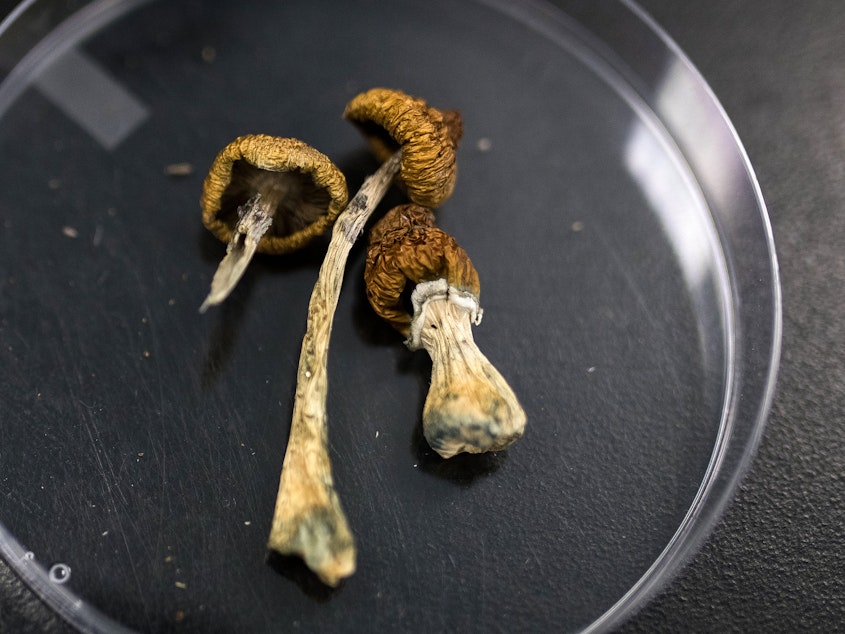Following near disaster for Alaska Airlines, concern over 'magic mushrooms' grows

After passing over Astoria, Ore., on Oct. 22, passengers on an Alaska Airlines flight from Everett to San Francisco were told their flight was being diverted to Portland.
An off-duty pilot attempted to pull a fire suppression lever, which would have shut the plane's engines off, according to court documents. Joseph David Emerson, the off-duty-pilot, later told police that his mental health had been declining for months, and he was dehydrated and sleep-deprived. He also said he’d taken psychedelic mushrooms 48 hours prior to the flight.
The recent emergency has brought renewed attention to the nationwide push to legalize so-called "magic mushrooms" for therapeutic uses.
This year, Oregon became the first state to allow the use of psilocybin, the active ingredient in psychedelic mushrooms, for adults. Colorado voters last year approved decriminalization and the development of supervised “healing centers” where psilocybin can be used.
A similar effort in the Washington State Legislature stalled during the 2022 session.
Sponsored
But anecdotal stories — like a pilot who takes mushrooms and tries to cut a plane’s engines — have raised concerns about the impact of legalization.
RELATED: In wake of Alaska's mid-air scare, researcher cites mental health gaps for commercial pilots
"The term magic mushrooms is a broad term that generally refers to a number of different species of mushrooms that have psilocybin inside of them," said Dr. Nathan Sackett, co-director for Novel Therapeutics in Addiction Psychiatry at the University of Washington School of Medicine. Along with other researchers at the University of Washington, he’s part of one of a few labs in the country studying the effects of psychedelic mushrooms on the human brain.
"Our primary interest is in exploring the therapeutic use of psychedelics: how to pair them with psychotherapy, and specifically, we're interested in targeting substance use disorders."
Funding for the University of Washington program was given earlier this year, and the group is currently working with officials at the Federal Drug Administration and the Drug Enforcement Agency to develop procedures and processes ahead of administering psilocybin in therapy trials.
Psilocybin is still listed as a Schedule I drug, which generally classifies them as having no medicinal value. However, both federal officials and local researchers believe that using psilocybin in controlled, supervised sessions could be helpful for people with post-traumatic stress disorder and alcohol use disorder.
Sponsored
"It really gives people the experience of stepping outside of their own internal narrative," Sackett said. "From a subjective experience, people describe having visualizations, intense emotions. And I think for a lot of folks, it's precisely the intensity of those emotions and experiences that allows them to almost reorient themselves to their own story and see things from a slightly different way."
The psilocybin used in lab trials is grown synthetically to control for dosage — psilocybin mushrooms found in the wild can widely vary in potency.
Details surrounding Emerson's use of mushrooms prior to the diverted Alaska Airlines flight are few. First, he stated that he had taken mushrooms 48 hours before the flight.
"From a purely pharmacologic perspective, the likelihood of psilocybin continuing to have effects on cognition, perception, and behavior 48 hours later would be exceedingly rare," Sackett said.
"Of course there are always outliers, and there is the possibility that there was some downstream kind of psychological effects," he added. "But it's really hard to say, given the nature of this of this story."
Sponsored
Emerson also reported feeling dehydrated and being awake for the previous 40 hours, and said he was suffering from a long-term mental breakdown over the course of several months.
Sackett said that dehydration is not an identified risk of someone who uses psilocybin, but insomnia could certainly be a side effect, though a lack of sleep usually corrects itself after about a day.
Sackett also noted that people with a history or a first-degree relation to someone with bipolar, thought, or seasonal affective disorders are generally excluded from psilocybin trials. Researchers believe that the use of psychedelics can worsen those pathologies, though more research needs to be done.
The recent Alaska Airlines flight emergency is only one example of psychedelic mushrooms making the news this year. In June, a gunman opened fire and killed two people at The Gorge Amphitheater, and later told law enforcement he was on psychedelic mushrooms and believed the world was ending.
Sackett said these incidents highlight the need to be very thoughtful and intentional about potential access to these compounds.
Sponsored
"Be very mindful that it's a complicated interaction, and that for all of these cases, it needs to be noted that these were utilized in a very uncontrolled environment," Sackett said. "When people use psychoactive compounds in an uncontrolled environment, there are always going to be risks."
Listen to the full interview with Sackett by clicking "play" on the audio icon above.





